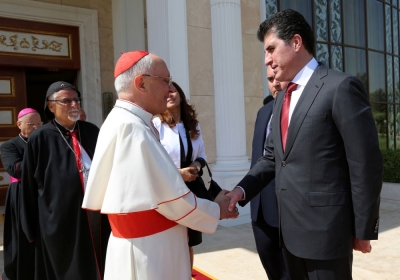Catholic Pope Has Few Options In the Middle East

There has been no shortage of outrage directed at the pope for calling the phantom president (serving the 11th year of a four year term) of the Palestinian Authority, Mahmoud Abbas, an angel of peace. Coming on the heels of the Vatican recognizing the equally fictitious state of Palestine, whose boundaries are a matter of conjecture, supporters of Israel have felt this was an additional act of betrayal.
But rather than unduly criticize the pope, we might wish to consider the tortured desperation confronting the leader of the Catholic Church as he watches daily reports of the wanton slaughter of Christians by an Islamic fundamentalism that is sweeping across the Middle East.
There is a reformation sweeping the Islamic world, but rather than being directed toward the greater advancement of liberty and tolerance, it has turned toward emulating the most violent and bloodthirsty aspects of Islam's beginnings. Like many revival movements, it requires "the other" (some group to be different) for its own definition of self.
Jews were thrown out of most of the Islamic Middle East over half a century ago, leaving Christians as the primary, but not the exclusive, source of a people apart.
Having long given up on religion, we, as secularists, cannot comprehend the attraction of a religious revival that combines the spiritual with the physical risks of Holy War.
Not only are we incapable of understanding the rise of Islamic fundamentalism, the leader of the free world also seems committed to leading from behind when it comes to stopping it.
The Pentagon can rattle off the number of sorties flown and targets destroyed, but the reality is Ramadi has fallen to the Islamic State and the Kurdish militia is still pleading for heavy arms and ammunition.
The international community is not coming to the aid of the Christian refugees. Christians are fearful of settling in Muslim-dominated UN refugee camps. All official refugees that are to be resettled come from these camps. Muslims will be resettled in America and other Western countries as official refugees. The Christians they keep out will have to fend for themselves.
To add insult to injury, only people persecuted by their government are considered refugees by the State Department. Rebels persecute Christians fleeing the Islamic State. They do not qualify. Only Jordan has responded to their plight.
This is the monumental problem the pope faces. But his pandering to the brutal Abbas will achieve nothing on behalf of the remnant of Christians that has not yet fled the indignities and brutalities they face under both Abbas' tyranny and the oppression of their Muslim neighbors. In Bethlehem, the city fathers are eager to take the tourist dollars of the faithful, but this once Christian city barely has any Christians left.
If the pope wants to truly understand why pandering to Abbas will not protect the Christians living under his control, the pope only has to look at how Abbas is responding to the plight of his own people wanting to flee Syria from the brutality of the Islamic State.
Faced with the suffering of his own people, Abbas rejected a deal that the UN negotiated with Israel to save Palestinians from slaughter in Syria. The agreement would have permitted Palestinian refugees living in Syria to resettle in the West Bank and Gaza. Abbas stated explicitly that he rejected such a deal, saying it's better they die in Syria than give up their right of return. The Palestine Liberation Organization has also ruled out any military action to rescue some 18,000 Palestinian refugees trapped in the Yarmouk camp near Damascus.
If Abbas will not come to the aid of his own people who are being slaughtered by the Islamic State, why would he jeopardize his fragile political status by protecting Christians from his Muslim constituency?
The Pope is playing a difficult hand and his options for protecting Christians are limited.
It is most appropriate to see in the pope's actions as a desperate response to protecting Christians in the one part of the Islamic Middle East where he perceives he might have some influence. This is an almost hopeless response to a humanitarian crisis that the world has chosen to ignore but which the pope cannot.





















